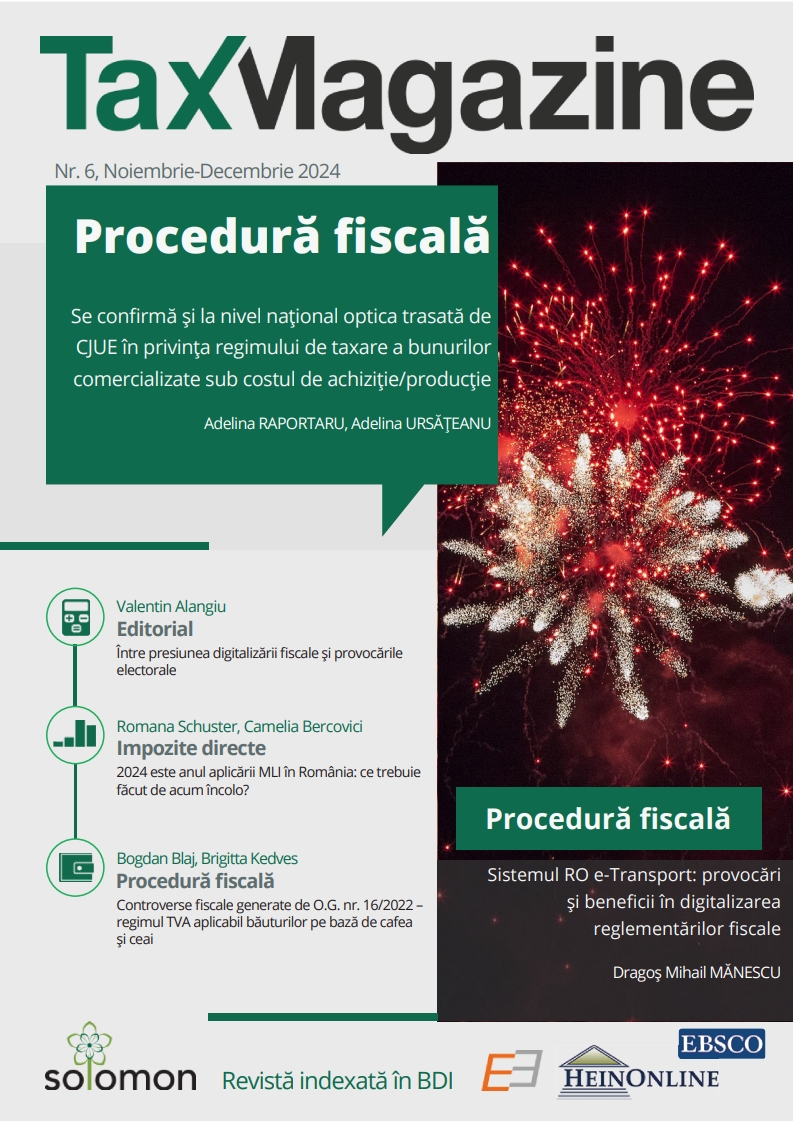
Buletin fiscal
Emergency Ordinance No. 138/2024 regarding the amendment and completion of certain normative acts in the fiscal-budgetary field, as well as for the regulation of other measures ('E.O. No. 138/2024').
More...We kindly inform you that, as long as the subject affiliation of our 300.000+ articles is in progress, you might get unsufficient or no results on your third level or second level search. In this case, please broaden your search criteria.

Emergency Ordinance No. 138/2024 regarding the amendment and completion of certain normative acts in the fiscal-budgetary field, as well as for the regulation of other measures ('E.O. No. 138/2024').
More...
Fiscal digitalization continues to be a strategic objective of the fiscal authorities in Romania, aiming to increase compliance and transparency, as well as to reduce tax evasion. In this context, three of the main systems implemented – e-VAT, e-Invoice, and e-Transport – have been recently updated through an emergency ordinance, which provides taxpayers with clarifications and, in some cases, additional adaptation periods. All the updates to the three digitalization systems were made through Emergency Ordinance No. 138/2024, published at the beginning of December in the Official Gazette. Among the most important updates are the postponement of sanctions for e-VAT and e-Transport by a few months, along with a series of changes related to the use of the e-Invoice system starting from January 1, 2025.
More...
At the present time, we are metaphorizing in the sense of Lakoff (1998) regarding the creation of a database which can generate new tastes using artificial intelligence. On the one hand, there is a discussion about whether artificial intelligence is capable of creating new tastes, while on the other hand, there is a metaphorization based on the translation of our experiences and sensory perception. These elements are central when analyzing the metaphorization of the database for the construction of new tastes. The discussion is characterized by the problematic translation of perception between humans and its transfer to the machine. In order to analyze this phenomenon, I shall rely on Lotman’s (1999) notion of translation, as well as the notion of Hartley, Ibrus, and Ojamaa (2021) of how the translation from sensory perception to digitization occurs. It is important to note that, according to Hartley, Ibrus, and Ojamaa (2021), this translation to the digital sphere is primarily carried out through linguistic means. It is this element which allows me to connect it to Lakoff ’s (1998) notion of metaphor. The methodology developed in this article is based on the semiotics of Charles Sanders Peirce (1839–1914), since it enables me to comprehend the notion of experience. Additionally, I shall draw on concepts developed by Biggio (2020) as he focuses on the computational phenomenon, combining a linguistic and social perspective. In order to understand these phenomena, I shall present some case studies related to taste and artificial intelligence. In summary, this study aims to shed light on the metaphorical connections between artificial intelligence and the construction of new tastes.
More...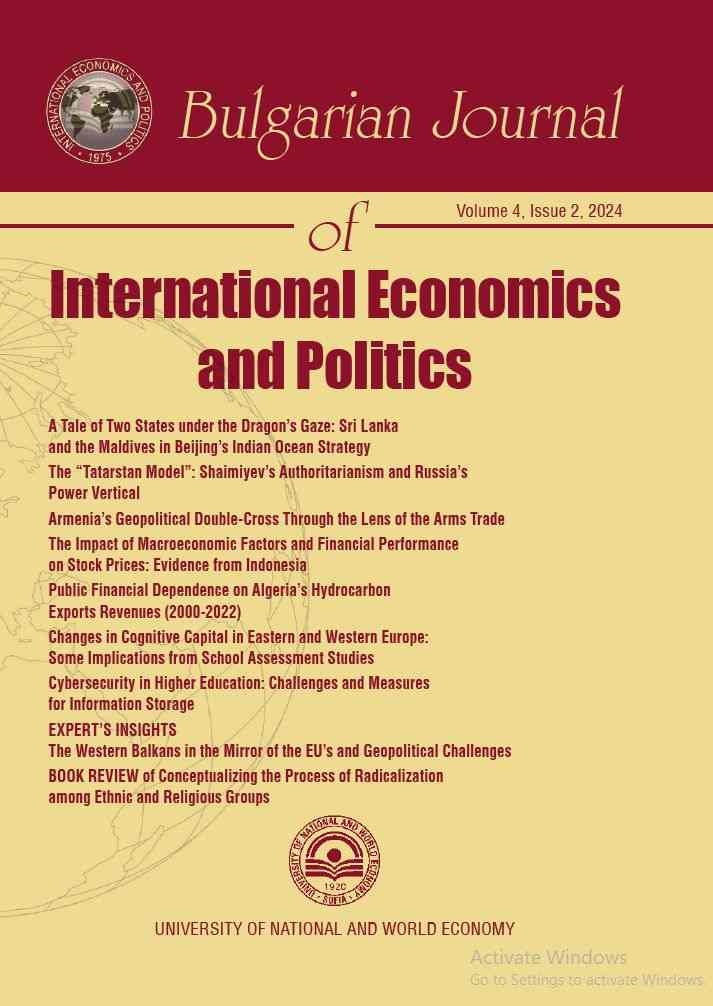
The ongoing growth of Chinese naval presence in Indian Ocean and PRC’s rapport with Maldives and Sri Lanka denote the importance of Indian Ocean to the Chinese. This article is an attempt to understand how China’s own set of rules lying beyond the rule-based international order help to penetrate the weak and fragile states. Seen from the perspective of the contemporary worldview, China’s rivalry with the existing norms prevailing in the liberal international order is similar to a clash between different worldviews, where some try to commit to the ideals espoused by the Atlantic Charter, such as self-government, economic prosperity, free trade, and the preservation of global goods, while others challenge its legitimacy. China’s abhorrence to the Western dominant international order reflects its own world view that differs from the West. This article seeks to examine China’s nuanced maritime policy towards the Indian Ocean and Beijing’s attempts to exploit the weaker states in the region. While examining these factors, this article aptly analyses China’s threat perception which leads Beijing to galvanize its security implications. Also, the results emerging from this paper will elucidate on how small states like Sri Lanka and the Maldives are likely to become the phony states in the security cauldron of South Asia.
More...
This study explores hydrocarbon dependency in Algeria, focusing on oil price fluctuations’ impact on public finance and fiscal policies from 2000 to 2022. Despite efforts to diversify revenue sources, hydrocarbon revenues remain central to Algeria’s public finances. Energy market volatility introduces uncertainty, affecting budget stability and economic planning. Historical fuel price fluctuations have influenced fiscal policies, enabling development during high prices and necessitating austerity measures during declines. Using a Vector Autoregression (VAR) model, our analysis reveals a short-term influence of oil prices on fiscal expenditures. These findings underscore Algeria’s vulnerability to global oil market shocks, impacting developmental policies and economic restructuring. This research contributes to understanding economic diversification in oil-dependent economies, illuminating public finance dependency on hydrocarbon and its implications for fiscal stability in Algeria.
More...
The article presents an analysis of national differences in the relative increase or decrease in scores on PISA, TIMSS and PIRLS between the year 1995 and the year 2019. We found that former Eastern Bloc countries and former Soviet republics had significantly stronger growth in PISA scores from 2000 to 2018 when the lower, on average, starting levels of school and economic performance are taken into account. However, this finding could hardly be replicated in the case of TIMSS between 1995 and 2019 and PIRLS between 2001 and 2016. We examine possible reasons for this finding, such as differences in the relative decline in cognitive ability between countries, and we explore their implications with regard to where future centres of cognitive capital may be located.
More...
In the modern digital age, cyber security has emerged as an issue of extreme importance, impacting various sectors and industries worldwide. Notably, higher education institutions have become prime targets for cyber-attacks and other security breaches due to their possession of a vast array of valuable and sensitive information. These institutions store a wealth of personal, financial and research data, making them attractive to malicious actors seeking to exploit vulnerabilities in their information systems. The consequences of such threats can be severe, including reputational damage, financial loss and even legal consequences. Additionally, the disruptive nature of these attacks could significantly disrupt the academic and administrative operations of these institutions, adversely affecting students, faculty and staff. The purpose of this paper is to undertake a comprehensive examination of the issue of cyber security in higher education and to propose practical solutions to address these challenges. This review will look at the different types of cyber threats these institutions face, with a particular focus on identifying the associated problems and presenting effective solutions. It is imperative that higher education institutions should undertake proactive measures to address these concerns as this will protect their position, strengthen the confidence of their stakeholders and ensure the continued pursuit of their educational goals.
More...
Western Balkans (WB) encompass six countries: Serbia, Bosnia and Herzegovina (BiH), Kosovo, Montenegro (MNE), Albania and North Macedonia (WB6). Given the importance of the Balkans for the European Union (EU), particularly in the light of recent geopolitical developments, the importance of the Ukraine war looms into importance and turns into watershed for WB-EU relations. The focus is therefore on the impact of the Ukraine war, but also that of the European Parliament’s (EP) elections on the WB-EU relationship. The analysis of these relations extends into a modest forecast for future developments outlining two possible scenarios depending on the development of the EU itself: a renewed and strong EU with a focus on integration or continued stagnation and growing nationalism with increase of centrifugal tendencies. The EU has the chance and the key opportunity to bring a positive change in the Western Balkans through strategic decisions and cooperation, thereby securing its own stability and prosperity. This is a shared European interest, and failure to act could turn the Balkans from a “white spot” on the political map into a “black hole.” Western Balkans (WB) encompass six countries: Serbia, Bosnia and Herzegovina (BiH), Kosovo, Montenegro (MNE), Albania and North Macedonia (WB6). Given the importance of the Balkans for the European Union (EU), particularly in the light of recent geopolitical developments, the importance of the Ukraine war looms into importance and turns into watershed for WB-EU relations. The focus is therefore on the impact of the Ukraine war, but also that of the European Parliament’s (EP) elections on the WB-EU relationship. The analysis of these relations extends into a modest forecast for future developments outlining two possible scenarios depending on the development of the EU itself: a renewed and strong EU with a focus on integration or continued stagnation and growing nationalism with increase of centrifugal tendencies. The EU has the chance and the key opportunity to bring a positive change in the Western Balkans through strategic decisions and cooperation, thereby securing its own stability and prosperity. This is a shared European interest, and failure to act could turn the Balkans from a “white spot” on the political map into a “black hole”.
More...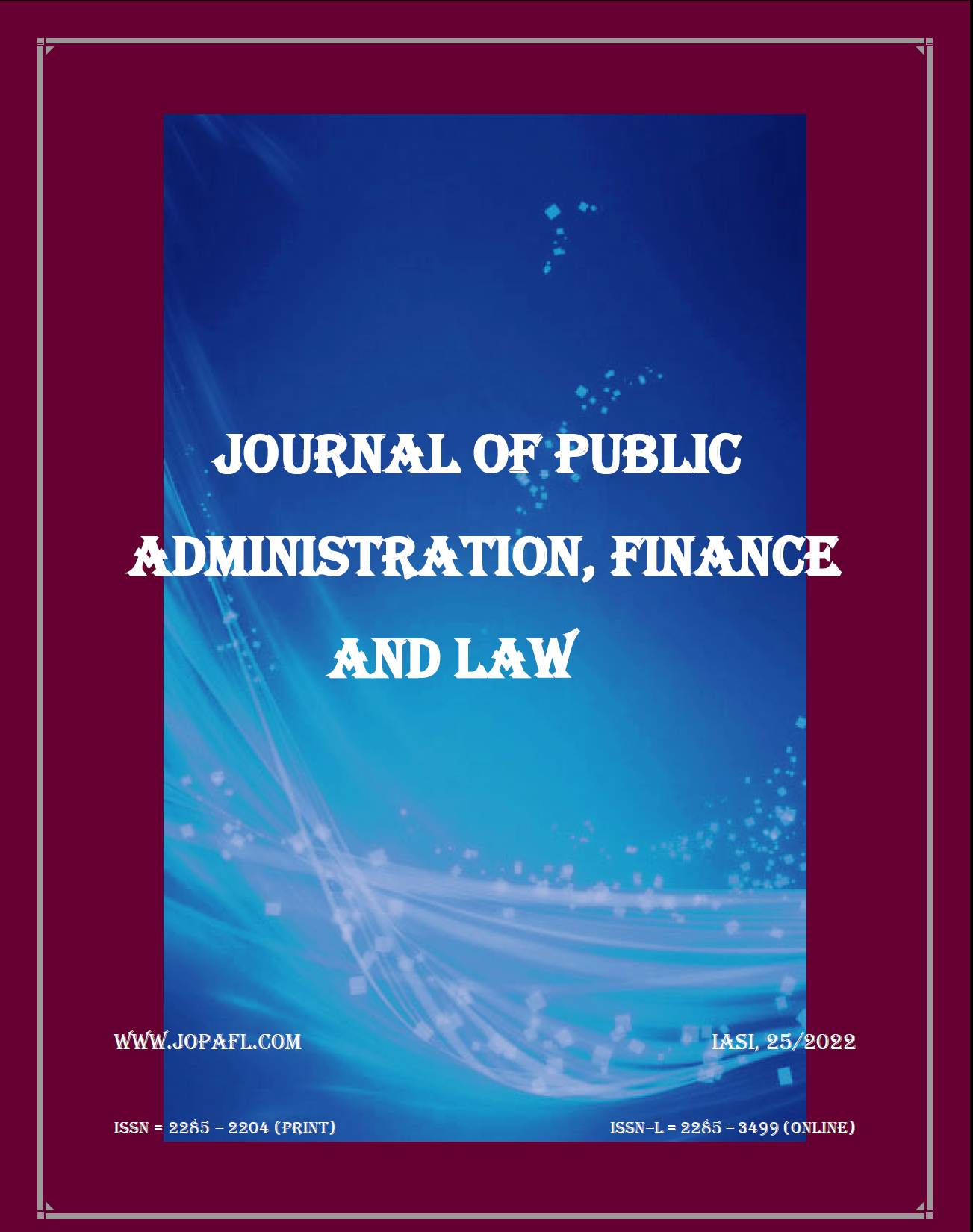
The 2020 pandemic has accelerated bankruptcy in economic sectors directly affected by the evolution of prices (the oil industry, transportation, entertainment, the car industry etc). Thus, the number of distressed businesses has grown. The current paper aims to answer the following legitimate questions: what are the methods to early detect distressed businesses, and what are the paths that one can use in order to warn them of imminent distress? According to the European Commission, a company is distressed if, in the absence of State intervention, it will shut down its short-term or middle-term operations. The use of a multitude of definitions for financial distress is explained through the failure to find a measure of enterprise decline. Each country uses different terms to describe insolvency. Still, a model is necessary to improve the accuracy of the prediction. Liquidity flows, profitability and the leverage effect are the most useful indicators to predict a business’ insolvency, along with: assessment of accounting documents, liquidity rates, changes in legislation etc. Certain steps have been taken to elaborate some innovative methods based on data and Artificial Intelligence. In the EU, there are three warning tendencies: the extra-judiciary tendency, the mixed tendency and the non-litigious judiciary tendency
More...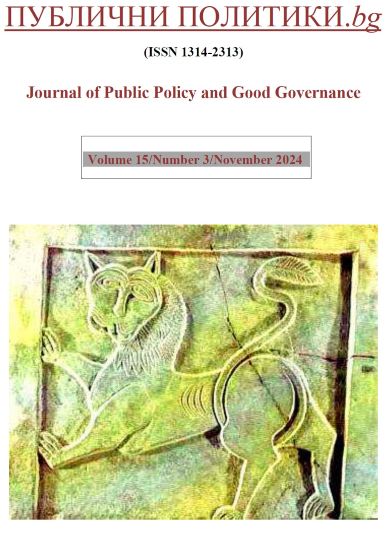
In the lively public policy debate in Bulgaria on the country joining the Eurozone, a claim is being made that real convergence of at least 90% is a crucial precondition for joining and therefore Bulgaria should wait until the early 2040s, because only then it is expected to achieve such convergence. The claim is supported with theoretical arguments, empirical evidence and forecasts. Here they are examined in some detail in the context of Bulgaria’s unique position as a country in the EU with a Currency board regime anchored in the euro. It is concluded that economic theory does not pose a requirement for any level of real convergence for an economic area to join a monetary union. In theory, problems due to a less-rich country joining a more affluent monetary union may, but also may not, cause problems such as excess inflation or amplified business cycle. It is also concluded that neither the claim that there exists a convergence threshold of 90% of real income per capita, nor the claim that Bulgaria will necessarily need at least two decades to reach it can withstand even most elementary checks for empirical robustness. Both the theoretical and the empirical claims that Bulgaria should wait for a 90% real convergence until at least the early 2040s before joining the Eurozone are found to have no real economic foundation.
More...
The article is dedicated to some misconceptions that modern society and its systems create among young people and how this affects their active and meaningful participation. The research interest was provoked by a series of observations while the author works with young people as a youth worker, researcher and lecturer in the field of youth policy. This experience outlined the mix use of certain notions that are indicative about confusions either at the level of the terminology or rather is a manifestation of deficit of knowledge of youth policies as public policies. The study takes active and meaningful youth participation as its object, and the various contemporary misconceptions of the mentioned below aspects and their respective impact as its subject of study. Its main goal is to clarify and harmonize the understanding of key issues that today's society constantly raises and to discuss how misconceptions directly affect and influence, most negatively, active and meaningful youth participation. This will improve the understanding of the role of the younger generation in various processes, as well as improve intergenerational dialogue and create a better environment for the development of teams, organizations and communities and their management.
More...
This article examines the role of the strategic approach in financial security. Its effective implementation is the basis for effective national policies in a number of other sectors. In the absence of such an approach, there will be not only missed benefits, but also inefficient administrative processes and practices. An example is the negative impact of corruption on the possibility of introducing appropriate environmental policies to limit the negative effects of anthropogenic climate change. In the absence of a strategic approach, most activities are reactive and are implemented as a result of international requirements. Such an example in Bulgaria are the measures aimed at improving the system for preventing and countering money laundering and terrorist financing.
More...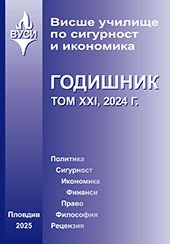
Since the first official use of the term „economic security“ by a Japanese government source in the 70s of the 20th century, the concept has not lost its relevance, and without suffering any additional syntactic processing, due to its extreme clarity and pragmatism, it continues to enrich its empirical field, because of the increase in the application of economic planning tools, economic competition and opposition. The article aims to examine the theory and the main points in the practical implementation of economic security and to highlight some aspects in view of their key importance for the future achievement of the goals of economic security.
More...
The object of taxation is the income of individuals and legal entities, received from certain activities, acquisition of property, etc. Income taxation is direct and indirect and is carried out in compliance with legal provisions. Deliberate submission of tax returns with incorrect and false information about realized income, with the aim of paying taxes in a small amount or not paying their real amount. Income taxation is carried out in two ways: voluntarily, by submitting annual tax returns; forcibly, by carrying out tax checks and audits, during which hidden incomes are established, the due taxes are charged, which are paid into the budget.
More...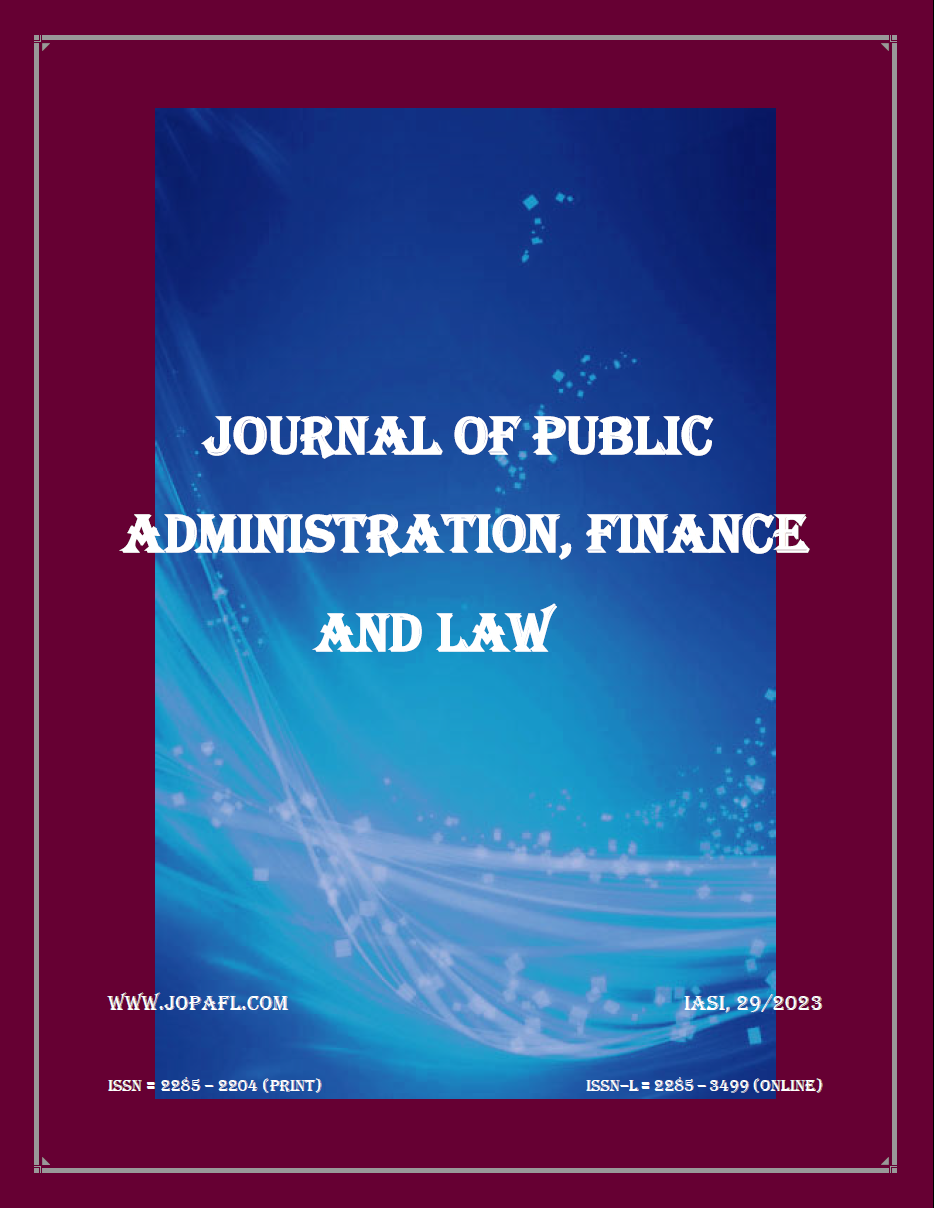
The successful delivery of construction projects is contingent upon a myriad of factors, with effective stakeholder management standing out as a linchpin in the intricate web of project dynamics. This study aimed at exploring the dynamics of stakeholder relationships in the construction project and provide insights that can inform both theory and practice in the realm of construction project management. Qualitative approach was used to explore the dynamics of stakeholder relationships during the delivery of a construction project. Semi structured interviews municipal mangers, project managers and focus group discussions were conducted community members. Political interference and lack of community involvement were found to have negative impact toward on the delivery of construction project. Politicisation of service delivery by ward councillors have been found to have to be the causal factor for lack of community involvement during the delivery of construction projects. Project managers and practitioners should adopt a nuanced approach that extends beyond conventional planning and execution, recognizing the socioeconomic and cultural intricacies of the community. The success of construction projects, as evidenced in Kayamandi, hinges on fostering collaboration and building partnerships with local entities. This study contributes to the evolving discourse on construction project management, theory, policy and practice in terms of stakeholder engagement strategies in the delivery of construction projects within the broader municipal landscape.
More...
The present article aims to explore the potential and the challenges facing the development of this part of the tourism sector. Bulgaria's potential as a medical treatment destination has grown significantly in recent years, primarily due to the enhancement of medical care and the advancements made by numerous healthcare facilities in the country. Medical tourism is a rapidly expanding market segment. While some stakeholders, such as the government and hospitals, express interest in its growth, others remain cautious and lack clear action plans and communication channels. The sector's functioning is primarily hindered by the individual interests of its various stakeholders, including hospitals, clinics, health care and tourism associations, as well as representatives from Bulgarian businesses and trade authorities. According to the surveyed experts, the imposition of strict regulations and rules hinders the development of medical tourism in Bulgaria and negatively impacts the sector's ability to overcome its challenges. Medical tourism, the development of a national brand, and bilateral agreements in the field of health and tourism with target markets and countries are the elements of working for positive growth in the sector, taking its full and substantial advantage, and overcoming stagnation and negative tendencies.
More...

Being one of the most important assets in governmental organizations and private companies, intelligence became a subject of interest for both researchers and practitioners in the last decades. In the literature, the concept of “intelligence” has got many meanings and interpretations, like psychological intelligence, emotional intelligence, spiritual intelligence, social intelligence, organizational intelligence, business intelligence, competitive intelligence, and national security intelligence. The core meaning of all these different specialized concepts remains the same: the capacity of processing data, information, and knowledge. Their differences come from the context in which these processes operates and the mission of the organizational structures which perform these specific processes. Business intelligence and competitive intelligence are characteristics of private companies, while national security intelligence is characteristic for the state-owned institutions. This paper aims to present a comparative analysis between business intelligence and national security intelligence based on a critical literature review and adopting a knowledge management perspective. The value of the present paper comes from the semantic tool used in our comparative analysis and the perspective of knowledge management adopted.
More...
The year 2020 forever altered the nature of labor, affecting every individual and organization on the planet. Remote work has provided some individuals with new employment prospects, more time with their families, and the choice of whether or not to commute. However, this has created new issues, as teams have grown more compartmentalized, and digital tiredness has become a serious threat. The purpose of this research is to offer an overview of the relationships between four main constructs, namely transformational leadership, employee engagement, wellbeing versus burnout via the employment of a bibliometric analysis using VOSviewer. In addition, the future goal – as derived from an in-depth study of the relevant literature - is to determine whether and to what extent the leadership style effects employee engagement, as well as their wellbeing versus burnout. The examination is designed to take place in the context of firms operating in hybrid work environments, mixing online and on-site work as well as contacts with coworkers and leadership. The primary premise is that the leadership style has a substantial impact on employee engagement and well-being, or burnout if they are not aligned with the present work issues.
More...